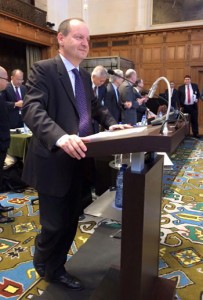The octagonal structures were later fortified with machinegun pods.
Mischief Reef was among the Chinese-occupied Philippine territories that was reclaimed early this year.
“A video simulation was also shown to the tribunal to demonstrate how a cutter suction dredger destroys the seabed and transfers sand to a pre-selected area,” Valte said.
Loewenstein argued “that by engaging in these activities, China has violated the sovereign rights of the Philippines with regard to living and non-living resources” in its exclusive economic zone (EEZ) and continental shelf.
The EEZ as defined under the United Nations Convention on the Law of the Sea (Unclos) is the area 200 nautical miles from a coastal state’s baselines, or “edges,” within which it has the exclusive rights to fish and exploit sea resources.
China has been building artificial islands to assert its claim over the West Philippine Sea.
The Philippines has protested these reclamation activities.
It earlier said such activities have destroyed 311 hectares of coral reefs in the West Philippine Sea. That is five times the size of Manila’s Rizal Park (Luneta).
During the hearing, the Philippines slammed China for its “flagrant and persistent” violations of international law.
Philippe Sands, another counsel of the Philippines, also argued that Panganiban (Mischief) Reef, Ayungin (Second Thomas) Shoal, Zamora (Subic) Reef, Mckennan Reef and Burgos (Gaven) Reef are all low-tide elevations under the Unclos and as such, are not entitled to its own territorial sea, exclusive economic zone (EEZ) or continental shelf.
He said China interferes with the Philippines’ rights under the Unclos as he cited incidents wherein private companies, contracted by the Philippine Department of Energy, “were prevented from exploration” in the West Philippine Sea.
Sands discussed China’s fishing ban “covering even areas in the Philippines’ EEZ.”
“As stated by Sands, China’s violations are ‘flagrant and persistent’ and they continue today,” Valte said.
Philippine delegation member Lawrence Martin, presented testimonies from Filipino fishermen “to prove China’s interference in the traditional fishing activities of Filipino fishermen around the South China Sea, particularly Bajo de Masinloc or Scarborough Shoal.”
Valte said a map from 1784 “was presented to prove that Bajo de Masinloc has always been part of the Philippines.”
‘Provocation’
China, which refuses to recognize and participate in the arbitral proceedings, called the ongoing hearings a provocation under the guise of law.
Emphasizing its firm stance on the issue, China, which asserts “indisputable” sovereignty over most of the resource-rich waters despite growing international concern, said it will not accept any decision that will be handed down by tribunal.
“The Philippines’ unilateral initiation and obstinate pushing forward of the South China Sea arbitration is a political provocation under the cloak of law,” Chinese Foreign Ministry spokesman Hong Lei told a news briefing in Beijing on Wednesday.
“It is in essence not an effort to settle disputes but an attempt to negate China’s territorial sovereignty and maritime rights and interests in the South China Sea,” Hong added.
The first round of arguments for the hearings on the merits of the Philippines’ case challenging the territorial claims of China began November 24 and the arguments are scheduled to last until Monday, November 30.


